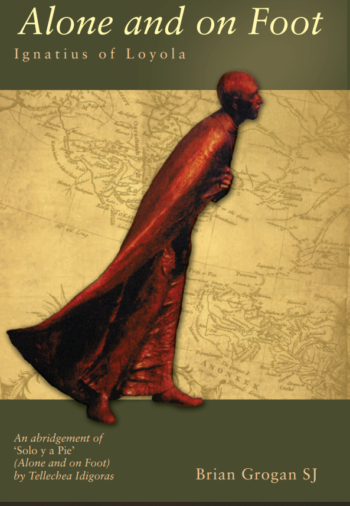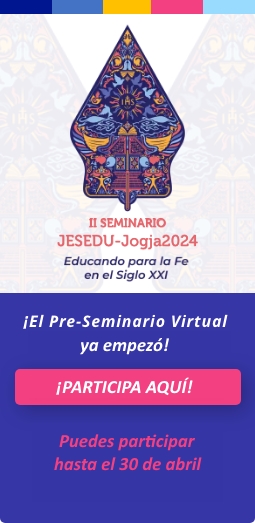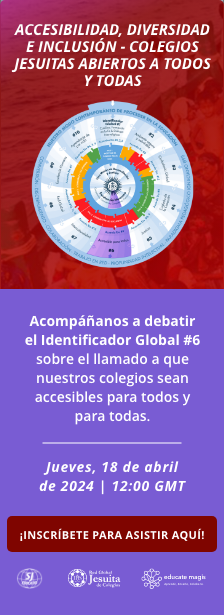When you want to be of use to the others, first accept yourself; the fire you ignite for the others has to be burning already in your home.”
In this striking line Ignatius of Loyola gives us food for reflection, but also challenges us by saying “accept yourself” and share the “fire already burning in your home”. What might this interior fire be that we want to ignite for others? What might this mean for Ignatian educators today? The Universal Apostolic Preferences (UAPs) invite the Jesuit family, including our schools, and us individually, to show the way to God and to deepen our knowledge and experience of Ignatian Spirituality (UAP #1) and to accompany and journey with the youth (UAP #3). These are key global orientations, but with local and personal implications. So, how might we, as Jesuit educators put these into practice? Perhaps one way to start this is with ourselves; “accept ourselves”, start where we are at on our spiritual journey and look at the flame burning inside us, and from there we can start self- and spiritual-development which can then be shared with others.
In the Jesuit tradition, the life, work and spiritual experiences of Ignatius exemplify a practical way to engage in one’s interior life, by starting with an awareness of personal experience. Some of the spiritual practices and processes Ignatius offered to his companions helped them uncover and deepen their own interior, spiritual development, which in turn helped ignite other fires. Some of these key practices were reflection and reflective prayer (the Examen), attentive listening and speaking (Spiritual Conversations), a specific process to make choices and decisions (Discernment) and integrating these into everyday life and work (Contemplation in Action). The practice and mastery of these Ignatian insights can also help us uncover and deepen our own interior, spiritual lives enabling us to better accompany others.

From May 20th, 2021, Educate Magis invites you to dive deeper into these practices by journeying through a new course created by members of our global community and for our global community titled “Four Key Practices in Ignatian Spirituality”. This date is important, as it coincides with the 500th anniversary of Ignatius being blessed by a cannonball in Pamplona and his subsequent conversion experience. This anniversary and other events of Ignatius’ life will be celebrated during the Ignatian Year 2021-2022, which has as its theme: to see all things new in Christ. This course is a great opportunity to walk with Ignatius on his spiritual journey and to gain a deeper understanding of how this 500-year-old tradition is still relevant today and can help us ignite this interior fire and share it with others. Ignatius’ influence is still very much felt today and his spiritual insights, practices and exercises are alive and fueling our Jesuit and Ignatian schools. We are all invited this year and beyond, to see all things new in Christ, following the example of Ignatius.
This course is an invitation to a personal journey, which is also a journey that is shared by the many Jesuit and Ignatian educators around the world who are invited to join this practical and interactive learning module.
What will you experience in this course?
As part of the course, you will be invited to read/contemplate the story of Ignatius through videos and excerpts from an engaging biography entitled «Alone and on Foot» by Brian Grogan SJ. Reflection questions accompany this content to give you time to pause and think about what you learned and relate it to your own experience. Note-taking and journaling are recommended for this course. There are activities and discussions that allow you to put these into practice and extension activities to help you implement/live out the desired outcomes beyond the learning of the course. The learning dynamic is based on the widely practiced Ignatian Pedagogical Paradigm (IPP), consisting of context, experience, reflection, action, and evaluation.
Reflection questions accompany this content to give you time to pause and think about what you learned and relate it to your own experience. Note-taking and journaling are recommended for this course. There are activities and discussions that allow you to put these into practice and extension activities to help you implement/live out the desired outcomes beyond the learning of the course. The learning dynamic is based on the widely practiced Ignatian Pedagogical Paradigm (IPP), consisting of context, experience, reflection, action, and evaluation.
As you go through this course you will be able to accomplish some or all the following:
- Discuss and demonstrate the importance and practice of Ignatian Reflection
- Practice the Examen of Consciousness according to the guidelines outlined by Ignatius of Loyola
- Describe and practice the foundations of Spiritual Conversation
- Convey how Ignatian Discernment and Decision Making enhance one’s spiritual being
- Model the practices of a Contemplative in Action
Formation for interiority (the Examen) was one of the 13 Actions which Jesuit Education Delegates agreed to at JESEDU-Rio in 2017. In 2019, the 10 Global Identifiers of a Jesuit School also emphasized faith formation and continuous formation in «A Living Tradition». Some of these connections are also included in the course to show the wider context implications of these four key Ignatian practices.
Who is this course for and how can you enrol?
This course is intended as a foundational module for new faculty and staff in Jesuit and Ignatian schools worldwide coming from diverse backgrounds within our education community regardless of culture, religious belief, or philosophy of life. This course is proposed to complement Ignatian formation programs offered by schools and it will be available to all Ignatian educators who work in Jesuit schools worldwide. Soon, you will be able to join the self-paced course, where you can take the course at your own pace and at a time that suits you. The recommended timeframe is to complete a lesson every second week and complete the course over a period of 8 weeks, and, depending on pace it can be completed between 12 and 16 hours (in total). For this self-paced course self-evaluation is advised. At the end of each lesson there will be a quiz, which, if completed successfully will lead to a certificate of completion. Another option is that you can seek out a trusted and experienced colleague for peer review and feedback on your course work. To be able to enrol in this course you will need to be a member of Educate Magis.
Later in the year a facilitated group or cohort learning option will also be offered, where groups from one or multiple schools, Jesuit provinces and wider (continental) regions will be able to learn together. We will provide more information about this option later in the year. Or, if you would like to receive more information about this option, please email us at: info@educatemagis.org
Who developed the course?
This course was developed as a collaborative project with members of our global community. The inspiration for the course came from Fr. Brian Grogan SJ, whose book «Alone and on Foot »serves as its foundational resource. Educate Magis also collaborated with the Institute of Spirituality at the Gregorian University in Rome. Video authors for this course come from the USA and India. and are teaching in Rome. Dr. Donna Orsuto is a Professor of Spirituality at the Pontifical Gregorian University in Rome. Originally from the United States, she also lectures and gives retreats worldwide. Fr. Rolphy Pinto SJ began teaching in the Institute of Spirituality of the same University from 2013. His field of interest is Ignatian spirituality in general and comparative spirituality in particular.
Piloting the course
We had the opportunity to run several pilots of this course with the Jesuit Schools Network (USA and Canada) and JECSE (Europe) to gather feedback and inputs from practitioners in the field. We also worked with individual members of the global community, who enhanced the course with their feedback and insights. Below we share a short paragraph that appeared in Hemispheres – JSN Global Newsletter after the first pilot course in 2020.
“With a combination of spiritual and intellectual depth, we engaged with the examen, spiritual conversation, Ignatian discernment and the call to be contemplatives in action. The Universal Apostolic Preferences challenge us to prayerfully proceed with actions– show, journey, walk, care. To best do this, we must focus and unite in embracing our foundation – this program will be essential for our way of proceeding and will be available through Educate Magis”.
We are looking forward to welcoming you to this learning experience on «4 Key Ignatian Spirituality Practices«.
If you have questions or comments please share them in the comment box below.
Inicia sesión o Hazte miembro
para crear y ver comentarios

